The Affair Read online
Page 3
Chapter Four
‘Hey, Scott, how’s it going?’ his editor’s voice boomed down the phone. ‘I’ve got a commission for you: fifteen hundred words on the Italian Communist Party. How does it differ from the style of Communism in the Soviet Bloc? What are its aims, and how much influence does it have in Italy? Think you can handle that?’
‘Sure! When do you need it?’
‘Is a week enough time? Or are you too busy chasing Italian chicks?’ The editor saw Scott as an international playboy type and Scott didn’t like to disillusion him by admitting he hadn’t had so much as a kiss since he arrived in Europe.
‘A week it is,’ he replied. At last he could demonstrate what he was capable of. Those booze-sodden hacks in the Eden Hotel bar would have to take him more seriously once he’d had an intelligent opinion piece published.
He needed some direct quotes from Roman politicians so his secretary told him about a translator called Angelo who could set up the interviews and assist when his very basic Italian would not suffice. It would be his foot in the door of Italian politics, and it was just a shame that the first politicians he would meet were Communists. Scott knew very strongly how he felt about that. In fact he had begun to write the piece before meeting them.
Some trade unionists here in Rome condemned the brutal Soviet repression of the Hungarian uprising, but the party leadership kept quiet because they know where their bread is buttered, he wrote. Moscow holds the purse strings on which their power base rests and even if they use more moderate language than Señor Fidel Castro, they still believe that the working classes should unite to overturn capitalism. Some 4 percent of Italian workers are members of the Communist Party but you can bet that these are not the forward-thinking textile workers who are making Milan such a modern center of clothing manufacture, and not the directors in charge of protecting the famous antiquities of Rome, Venice and Florence, because Communism would abandon those to dust. It is the politically ignorant peasant who believes all those fine words about sharing wealth, little realising that under Communism there would be no wealth, along with no freedom of speech or action.
He interviewed the politicians but used their quotes in such a way as to make them sound naïve at best and self-serving at worst:
Corruption is a way of life in Italy, he opined, and no one is exempt, but those of the far left with their moral posturing about the good of the many are by far the greatest hypocrites. Look how quickly Señor Castro rushed to abandon democratic elections in Cuba earlier this year. Given half a chance, Italian Communists would do so even faster.
It was what his readers in the Midwest, smarting from American defeat in the Bay of Pigs just four months earlier, wanted to hear, and it happened to be what Scott believed. He and his classmates at Harvard had been aghast when the CIA-trained band of counter-revolutionaries were defeated by Castro’s forces, with their Soviet-designed tank destroyers and fighter-bombers. Now it seemed Americans must resign themselves to Reds on the doorstep, just 90 miles across the water from the Florida Keys, unless John F. Kennedy had some other plan up his sleeve. Surely he must.
Scott’s editor ran the piece across a double page, with photos of Italian workers in the fields alongside a textile loom in Milan, and Scott was thrilled when he got his copy by special courier. His byline was directly beneath the headline: ‘by Scott Morgan, our Rome correspondent’.
A day later, though, he received a phone call from Angelo, the translator. ‘I hope you never want to interview any Italian politicians again,’ he said, ‘because, to use an English phrase, you have burned all your boats.’
‘Nobody will read it here in Rome, will they?’ Scott asked. The thought simply hadn’t occurred to him.
‘Of course they will. They gave the interviews and their press advisors will have obtained copies to see how they were portrayed in your article. You can be sure they will not be pleased with your patronising attitude and lack of any attempt to understand the issues.’
‘You’re kidding. Why didn’t you warn me?’
‘My mistake. I gave you credit for a little intelligence.’
That evening, Scott went to the Eden Hotel to see what his compatriots thought, and he was greeted with much hooting and clapping on the back. ‘Aw heck, you didn’t want to be a political journalist anyway, did you, Spike?’
‘You’ve all read it?’
‘How could we miss your print debut, especially when it refers to Communist Party members as politically ignorant peasants?’
Joe bought him a large whisky and Scott downed it quickly.
‘Shall I tell you my secret?’ Joe slurred, his evening’s drinking obviously well advanced. ‘I read the Italian press and adapt stories from that. My editor never knows any better. Grab a dictionary and spend the morning going through Corriere della Sera and La Stampa and you’ll do just fine here.’
The next morning, Scott decided to do just that, but the only stories of international interest were about Elizabeth Taylor and her entourage arriving in Rome to make a Cleopatra film at Cinecittà. There were descriptions of her seven-bedroom villa on Via Appia Antica, her children, her dogs, her recent near-death illness, and a rehash of the scandal when she ‘stole’ her current husband Eddie Fisher from her rival Debbie Reynolds. Scott was scornful of this kind of gutter-press journalism and determined not to lower himself. His heroes were Norman Mailer and Tom Wolfe, serious men who wrote in an innovative style that read like fiction but contained hard facts. Neither of them would sink so low as to comment on Elizabeth Taylor’s dogs. He felt gloomy.
The clock read twenty past ten and he realised he just had time to catch his beautiful Italian girl leaving her house. She had begun smiling at him when he greeted her and once she had even returned his ‘Buongiorno’ so he felt it was important to keep up the momentum.
He jumped on the Vespa and scooted through the traffic, arriving in Piazza Navona with minutes to spare. He popped into a tobacconist’s to buy some Camels and through the window he saw her emerge from her house and cross the street. Throwing the money over the counter, he was able to step out of the shop straight into her path.
‘Ah, buongiorno, signorina bellissima,’ he grinned. ‘We meet finalmente!’
She blushed and looked down modestly. He was directly in front of her so she couldn’t walk on and there was a moment’s hesitation while she tried to decide what to do.
‘That’s a pretty dress,’ he said in Italian.
‘Grazie, signore,’ she said, then side-stepped neatly and continued down the road.
Scott stood and watched and when she reached the corner she turned back to see if he was still there.
‘Thank you!’ he whispered, and clenched his fists in delight.
Chapter Five
Next morning, Diana was picked up by a studio car just after eight and driven out to Cinecittà. The gate swung open and she felt very important as she showed her pass to the guard on duty and he waved her through with a ‘Buongiorno, Signora Bailey’.
When she opened the door of the production office, the first thing she noticed was a very attractive Italian man sitting on a desk, chatting to the girls in the office. He appraised Diana’s figure, eyes sweeping up and down her body, then winked.
‘Is she the one who’s been causing all the problems? She looks so innocent.’ He was teasing, his English fluent but heavily accented.
Annoyingly, Diana felt her cheeks flush scarlet and a blonde woman who looked as though she might be in her thirties took pity on her. She came over with an outstretched hand. ‘I’m Hilary Armitage, and you must be Diana? This rogue here is Ernesto Balboni. He helps to procure things we need for the film.’
‘You have been complaining about the elephants, I hear,’ Ernesto challenged. ‘What did the poor creatures ever do to you?’
Diana didn’t know how to take him, so she answered seriously. ‘I’m sorry, I didn’t mean to cause trouble but Cleopatra wouldn’t have had Indian elephants …’
/>
‘Clever you for actually knowing the difference,’ Hilary interrupted. Her accent was English girls’ boarding school, but she didn’t seem toffee-nosed.
‘They wanted elephants, I got them elephants,’ Ernesto continued. ‘It was a lot of trouble for me, and now you say, “I don’t like these elephants.” OK, I will fix it, but only if Diana will have lunch with me today.’
‘I-I’m not sure. I may be busy.’ Diana wasn’t sure if he was simply being flirtatious or if it was part of her job to lunch with him.
‘Leave the girl alone, Ernesto. She’s just arrived and already you are trying to seduce her.’
He jumped down from the desk and Diana saw that he wasn’t tall – only slightly taller than her – but he had a very good figure, with muscular arms under his open-necked, short-sleeved shirt. He reached out to shake Diana’s hand and gripped it in warm fingers that held on much longer than they should have. ‘We will have to see a lot of each other so I can choose props that are historically correct. If you can’t manage lunch, maybe we should have dinner tonight?’
Fearing a misunderstanding, Diana held out her left hand to show her wedding ring. ‘I’m married,’ she said.
‘Of course you are. You are far too beautiful to be single. I’ll see you later. Buongiorno, bella.’
He glanced back and grinned at her on his way out the door. Did that mean he thought she had accepted the dinner invitation or not? She had no idea, but hoped that since they hadn’t made a firm arrangement it didn’t count.
Hilary rolled her eyes before showing Diana her desk and giving her a simple map of the studios to help her find her way around. She explained how to use the telephones and said to help herself if she wanted to phone home; she showed her where the stationery was kept, and the kettle and their office supply of English tea. She was friendly and efficient, but several times she glanced at her watch so Diana could tell she was impatient to get on.
‘Do you have any idea what I am supposed to be doing today?’ Diana asked. ‘I haven’t seen Mr Wanger yet to ask about my responsibilities.’
Hilary seemed surprised. ‘I assumed he would have explained that to you. He won’t be in till later because there was a PR disaster yesterday. A party of Congress wives turned up for a tour of the set hoping to meet Elizabeth Taylor but no one had told her and she doesn’t like surprises so she wouldn’t play ball. Walter will be tied up all day smoothing that one over. But they’re filming a Temple of Isis scene on sound stage 5 so why not go down there and maybe you’ll have a chance to introduce yourself to Joe.’
‘The director?’
Hilary nodded. ‘You’ll find sound stage 5 on your map. Lunch is served in the commissary from twelve till three, and you can get snacks at the bar all day long.’
‘Great, thanks.’
The office was empty so Diana made herself a cup of tea, then unclipped her right earring and lifted the phone to ask the operator to connect her with Trevor’s office at City University. There was a lot of clicking and buzzing and a long period of silence before she heard the familiar voice of his secretary on the line.
‘Hello, it’s Diana calling from Rome. I don’t suppose Trevor’s around?’
The reply was so muffled she could hardly hear it, but it seemed he was in a meeting.
‘Will you tell him I rang and that I’ve arrived safely? I’ll try again soon.’
She was relieved not to have to deal with him being curt on the phone. At least he knew she was safe now. She finished her tea, picked up a notepad and pen plus her studio map, and headed out towards sound stage 5.
She walked around the lawn, then turned down a wide avenue with a row of pine trees planted along a central reservation. The sound stages looked like aeroplane hangars. When she got to number 5, she pushed open a heavy, padded door and was confronted by a huge dark cavern full of people. A beam of light illuminated an area where a scene was being prepared. There was a camera mounted on a small crane and behind it stood a portly middle-aged man in a crumpled Hawaiian shirt and a baseball cap, who was studying the scene with a dyspeptic expression. She wondered what his role was because, despite his scruffy appearance, others seemed to be taking orders from him.
It was hotter than outside, like working in an oven. A huge sign in both English and Italian read ‘No Smoking’ and there was a picture of a cigarette with an emphatic slash through it. Underneath it there was a bucket of sand and a sign saying ‘Use in case of fire’ but she noticed that it was being used as an ashtray and had dozens of cigarette butts in it.
‘Are they filming?’ she asked someone, and straight away fingers came up to lips and there was a chorus of shushing. Someone called ‘Silenzio!’
‘Upstairs,’ her nearest neighbour whispered, pointing to a staircase, so Diana crept off the set and up the stairs, not sure where she was heading. A handwritten sign on the landing at the top said ‘Makeup, Dressing room 23’. There was a long corridor of closed doors, each carefully numbered. The only one open was number 23 and a bright light emanated from within. She glanced inside to see a pretty blonde girl doing her own makeup at a dressing-table mirror surrounded by dazzling lightbulbs. Some Italian women were sitting around chatting.
‘Hello. Are you an actress?’ Diana asked the blonde girl.
She gave a broad smile and answered in an English accent with a hint of Birmingham in it. ‘No, I do the makeup along with these ladies. I’m just fixing myself up while we wait.’
‘What are you waiting for?’
‘Elizabeth Taylor’s not here yet so they can’t start filming. She’s always late.’
‘So they’re not actually filming downstairs?’ Diana was relieved. ‘I thought I’d spoiled a shot because I asked a question and everyone told me to shut up.’
‘They might have been doing fill-in shots. They’re shooting live sound on this picture so they need dead quiet when the cameras are rolling. You’re supposed to check whether the red light is on above the door before you go in. Don’t worry, though – you’d know all about it if you’d spoiled a take!’
‘Where is your accent from?’ Diana asked, trying to place it.
‘Leamington Spa. Near Warwick.’
‘You’re kidding! I was born in Leamington Spa and lived there till I was twelve!’ Diana grinned, delighted to meet someone from home. It made her realise how lonely she’d been feeling.
The girl’s name was Helen, she told Diana. They chatted about which part of town they came from and the schools they had attended. Diana asked how she came to be working on the film, and Helen said she had just graduated from a makeup course when she got the job at Pinewood and her school principal had negotiated a clause in her contract that meant they had to take her with them when the production moved to Rome. Most of the other makeup artists were Italian.
‘It’s a great place to work. I’ve met all the stars,’ she said excitedly. ‘Yesterday I was called down to assist Elizabeth Taylor’s makeup artist, and Elizabeth actually asked my name. Wasn’t that nice of her?’
‘What was she like?’
‘Oh my God, those eyes! I never believed it in the magazines when they said she has purple eyes but she really does: a kind of deep violet shade. It’s almost like you can’t breathe when you look directly at her. I asked her to sign my autograph book. Look!’
She showed Diana a book bound in pink fabric and opened it to a page with the signature ‘Elizabeth T’ followed by an ‘X’.
‘Lucky you,’ Diana said. ‘Who else’s have you got?’
‘Just crew really. I don’t like to ask actors as it doesn’t look professional. After all I’m here to do a job! Anyway, Rex Harrison is too scary to ask!’
Helen talked rapidly, full of awe at the surroundings she found herself in. She was probably in her early twenties, only a couple of years younger than Diana, but she had a childlike quality that was beguiling, and she was the first truly friendly person Diana had met there.
‘There’s no one about,�
�� Helen pointed out. ‘Shall we go and have a Coke? The bar’s not far.’
Diana agreed. She knew she should be trying to find someone who could tell her what her job entailed, but perhaps it would be useful to hear a bit more about the personalities on the set. Helen told the Italian women she’d be back in half an hour and they nodded and carried on talking amongst themselves.
The bar had some tables on a broad outdoor terrace and Helen sat down at one of them, Diana beside her. They attracted appreciative glances from some Italian workmen on a coffee break. They’re interested in Helen, Diana thought. Not me.
‘I don’t like coming here on my own,’ Helen lowered her voice. ‘It makes me self-conscious when they stare like that.’
They ordered two Cokes, and Diana explained how she came to be working on the film.
‘Gosh, you’re an intellectual. That’s so groovy! Don’t worry about not knowing what you’re supposed to be doing. I don’t think anyone does. We’re all just muddling through, but we’re getting paid to live in an amazing city and work with lots of famous people. It can’t be bad, can it? Hey, a crowd of us are going out for a pizza tonight. Do you want to come?’
Diana agreed straight away. She would rather do that than go for dinner with Ernesto, which had all the potential to be compromising.
‘Amazing! Give me the address of your pensione and I’ll pick you up in a taxi about eight o’clock.’ Suddenly she nudged Diana and nodded towards a man walking down the avenue holding a small dog.
‘Who’s that?’ Diana whispered.
‘Eddie Fisher, Elizabeth Taylor’s husband. The one she stole from Debbie Reynolds. He’s handsome, isn’t he?’

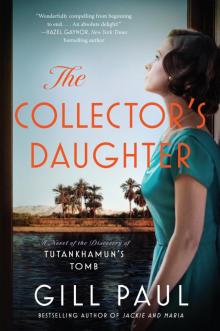 The Collector's Daughter
The Collector's Daughter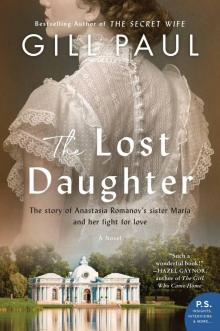 The Lost Daughter
The Lost Daughter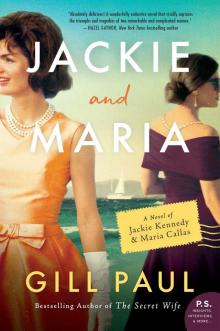 Jackie and Maria
Jackie and Maria The Affair
The Affair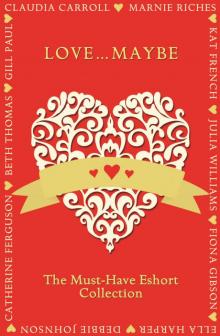 Love...Maybe
Love...Maybe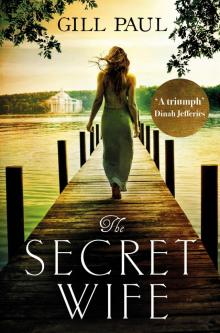 The Secret Wife
The Secret Wife No Place For a Lady
No Place For a Lady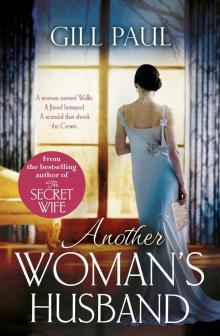 Another Woman’s Husband
Another Woman’s Husband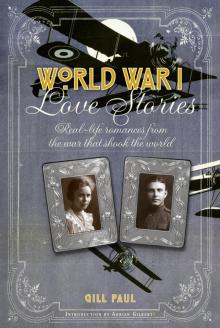 World War I Love Stories
World War I Love Stories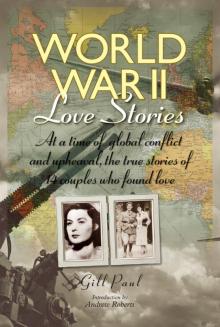 World War II Love Stories
World War II Love Stories